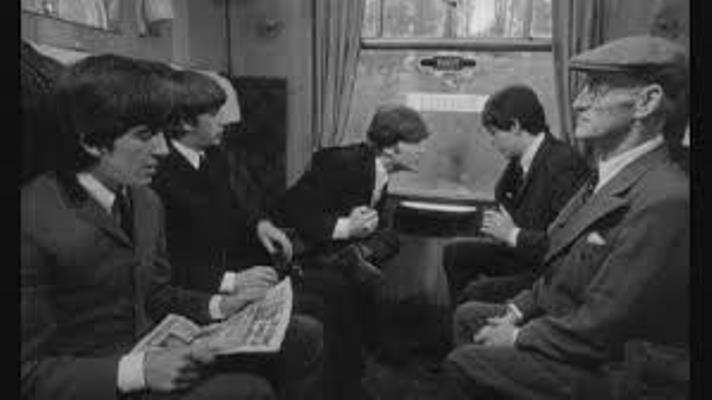|
The two of us, whacked by a cold, missed a nice party on New Year’s Eve.
Younger people staying home would line up DVDs or Netflix or something streaming. We played clicker roulette, with my only resolution to avoid the rancid pairing of Kathy Griffin and Anderson Cooper. (He is out; the joke never did work, people.) There was a rather classy concert by the New York Philharmonic on PBS – jazz and an orchestra. Then I started clicking. Four slender lads were running around a field, hair flopping in the breeze, coping with a grumpy old man with an overbite who kept insisting he was, at least, clean. Grandfather McCartney. Suddenly it was 1964 all over again. I did not pay much attention to the Beatles at first but one morning I was listening to one of my favorite disk jockeys, William B. Williams, on “W-N-E-W, 11-three-oh on your dial,” as the jingle went. William B, was normally cool – a champion of Nat Cole, Ella Fitzgerald, Frank Sinatra, Tony Bennett and Peggy Lee – but that morning he was denouncing a quartet of moppy-maned Brits for desecrating the air waves. He was so angry that he broke the Beatles’ new vinyl record, right on the air. I could hear shards clattering into the waste-paper basket. Geez, what was threatening William B? One night that fall we lined up a baby-sitter and caught Hard Day’s Night. There they were, cheeky lads, goofing on people, minding Paul’s cantankerous grandpa, being pursued by girls, always in motion. We were smitten in 1964, and we were smitten again on New Year’s Eve, mostly by the music, but also by the understated irony. Who will ever forget the glum lament by Ringo in Yellow Submarine, stuck at the bottom of the ocean, speaking in flat Liverpool dialect: “I want me mum.” Or the agitator that was my favorite Beatle, John Lennon, putting Paul’s grandfather in his place in Hard Day’s Night: John: You know your trouble, you should have gone west to America. You would have been a senior citizen of Boston. But you took a wrong turn, and what happened? You're a lonely old man from Liverpool. Grandfather: [Sour] But I'm clean. John: [Cheerful cynicism] Are you? The lads ace their television appearance but their reward is not the birds of London but an update from management: “They think it'd be better if we pushed straight to Wolverhampton.” And that’s where the movie ends. Two people home with a cold clickered around and found Jennifer Lopez and Taylor Swift conducting contemporary pop concerts with the charmless intensity of a new year’s resolution workout. My wife delivered her critique: “The last 50 years, eat your heart out.” Happy New Year. He was very clean. The Beatles all agreed on that. In the movie, “A Hard Day’s Night,” the lads discussed him as the five of them rode in a railroad compartment. I did not get on the train with the Beatles at the first stop, so to speak, but one day in 1964 I heard William B. Williams, one of my favorite disk jockeys, break a Beatles record (vinyl), right on the air, WNEW-AM. What musical trash, he said. Good grief, how bad could it be? My wife and I went out to see the movie a few nights later and were enchanted. Then of course their music became more complicated, more dark, and so did their lives, and we became fans forever. Then I was young enough to have a grandfather. Now I am an actual grandfather. Do my grandkids think I’m very clean? I’ll have to text them. I’ve often wondered about Paul’s grandfather. Now I know. He’s still alive. He was on the tube the other day. I’d recognize him anywhere, that bony face, that surly glare. He was very clean, the lads used to agree. Nowadays, it works the other way. Paul’s grandfather assures us he’s very clean, in a legal sense, that is. |
Categories
All
|










